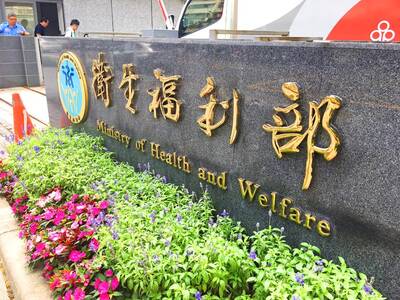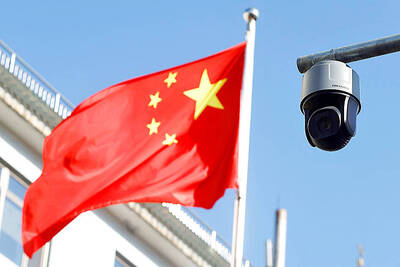The Chinese military was able to land in the northern part of the country during computerized war game simulations due to a disconnect between the command center and the army, a media report said yesterday.
The annual Han Kuang computer exercise took place from April 17 to April 22. According to a report in the Liberty Times (the Taipei Times' sister newspaper), the military did well in a sea battle in the Taiwan Strait. But because of a breakdown in communication between the command center and the the Sixth Army, which is in charge of ground defense in the north, the Chinese ground troops were able to reach land and march to Taipei.
The report quoted a Ministry of National Defense official as saying that "during the third day of the simulation, Chinese vessels crossing the Taiwan Strait were under fierce attack from the navy's four Kidd Class destroyers." The destroyers helped to repel 25 percent of the enemy's invading force before it could reach the northern shores, and the attackers were forced to make for shores further south, the report said.
However, by the night of the third day, the frustrated Chinese invading force suddenly turned its attention to the north once more after gaining support from further vessels. Troops then successfully landed on the shores between Tamsui (
Since the command center failed to inform the Sixth Army of the landing in a timely manner, the division was unable to block them in time, according to the report.
The report said the Chinese troops then swiftly advanced along the Yangjin Highway (陽金公路) toward Taipei. Although troops stationed in Taipei moved to the Yangmingshan area in an attempt to halt the Chinese advance, they failed because they were outnumbered and the Chinese were covered by air support, the report said.
The ministry announced the end of the war games when Chinese troops reached Taipei, the report added.
The report said the ministry considered the communication breakdown a serious flaw and had asked the military to improve its channels of communication.
The report added that the four Kidd Class destroyers were regarded as making a good contribution in the simulation. The navy initially deployed two of the destroyers in the south and two in the north. But when Chinese ships attempted to approach the north, the navy made a bold decision to deploy all four destroyers in the waters off the northern part of the country. The move paid off as the destroyers blocked the invading force from approaching Taipei.

POLAM KOPITIAM CASE: Of the two people still in hospital, one has undergone a liver transplant and is improving, while the other is being evaluated for a liver transplant A fourth person has died from bongkrek acid poisoning linked to the Polam Kopitiam (寶林茶室) restaurant in Taipei’s Far Eastern Sogo Xinyi A13 Department Store, the Ministry of Health and Welfare said yesterday, as two other people remain seriously ill in hospital. The first death was reported on March 24. The man had been 39 years old and had eaten at the restaurant on March 22. As more cases of suspected food poisoning involving people who had eaten at the restaurant were reported by hospitals on March 26, the ministry and the Taipei Department of Health launched an investigation. The Food and

A fourth person has died in a food poisoning outbreak linked to the Xinyi (信義) branch of Malaysian restaurant chain Polam Kopitiam (寶林茶室) in Taipei, Deputy Minister of Health and Welfare Victor Wang (王必勝) said on Monday. It was the second fatality in three days, after another was announced on Saturday. The 40-year-old woman experienced multiple organ failure in the early hours on Monday, and the family decided not to undergo emergency resuscitation, Wang said. She initially showed signs of improvement after seeking medical treatment for nausea, vomiting and diarrhea, but her condition worsened due to an infection, he said. Two others who

MEDICAL: The bills would also upgrade the status of the Ethical Guidelines Governing the Research of Human Embryos and Embryonic Stem Cell Research to law The Executive Yuan yesterday approved two bills to govern regenerative medicine that aim to boost development of the field. Taiwan would reach an important milestone in regenerative medicine development with passage of the regenerative medicine act and the regenerative medicine preparations ordinance, which would allow studies to proceed and treatments to be developed, Deputy Minister of Health and Welfare Victor Wang (王必勝) told reporters at a news conference after a Cabinet meeting. Regenerative treatments have been used for several conditions, including cancer — by regenerating blood cells — and restoring joint function in soft tissue, Wang said. The draft legislation requires regenerative treatments

Taiwanese should be mindful when visiting China, as Beijing in July is likely to tighten the implementation of policies on national security following the introduction of two regulations, a researcher said on Saturday. China on Friday unveiled the regulations governing the law enforcement and judicial activities of national security agencies. They would help crack down on “illegal” and “criminal” activities that Beijing considers to be endangering national security, according to reports by China’s state media. The definition of what constitutes a national security threat in China is vague, Taiwan Thinktank researcher Wu Se-chih (吳瑟致) said. The two procedural regulations are to provide Chinese